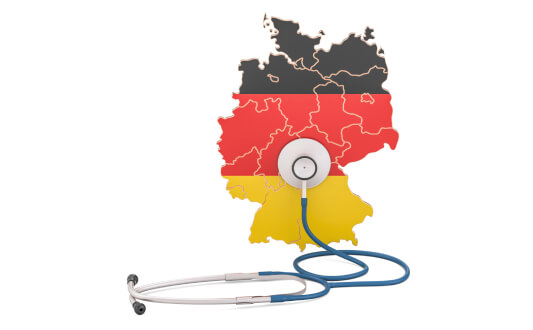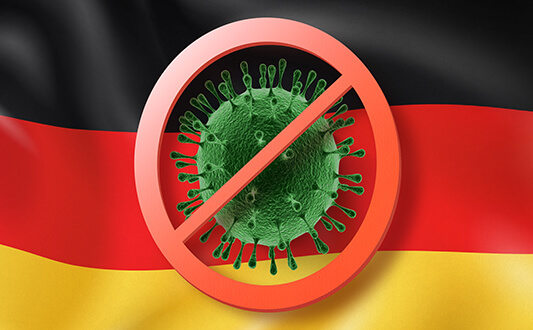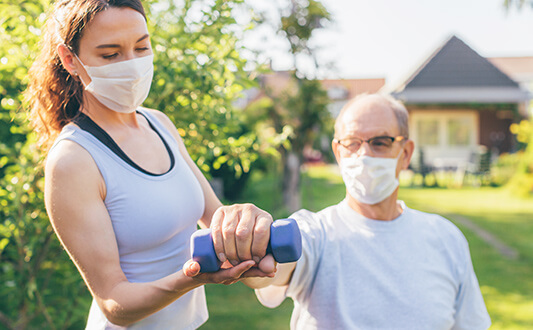Novel methods of COVID-19 prevention and updated therapeutic protocols are constantly being developed, as the death rate from SARS-CoV-2 still reaches 2%. Vaccination against SARS-CoV-2 is an efficient preventive measure that reduces the burden on the medical system and increases the number of people with mild forms of the disease. German hospitals offer approved vaccines with the highest efficacy and minimal risks of side effects and comprehensive preliminary examination and follow-up for foreigners who want to get vaccinated against coronavirus in Germany.
Which vaccines against COVID-19 are available?
Currently, four vaccines are actively used in clinical practice worldwide. These are
- BioNTech, Pfizer vaccine
- Moderna vaccine
- Johnson & Johnson vaccine
- Oxford, AstraZeneca vaccine
All the vaccines are available in German hospitals so that physicians can choose the most appropriate one for each person. The basic characteristics of vaccines are described below.
BioNTech, Pfizer vaccine is the messenger RNA (mRNA) vaccine that was the first vaccine to receive the full FDA approval (emergency use authorization – Dec 11, 2020; full FDA approval – Aug 23, 2021). All other vaccines are currently authorized only for emergency use. It is recommended for teenagers and adults 12 years and older. Vaccination of newborns in Germany is not performed due to safety reasons. The therapeutic regimen includes administering two doses three weeks apart; a booster shot may be injected eight months after the second dose. BioNTech, Pfizer vaccine can be used in people with low immune function (e.g., people with HIV, people who take immunosuppressive drugs, etc.).
Moderna vaccine is also the mRNA vaccine that received the emergency use authorization on the 18th of December, 2020. It is currently approved for people 18 years and older, and testing for ages 12-17 is ongoing. The therapeutic regimen includes administering two doses four weeks apart; a booster shot may be injected eight months after the second dose. Moderna vaccine can also be used in people with low immune function (e.g., people with HIV, people who take immunosuppressive drugs, etc.).
Oxford, AstraZeneca vaccine is the inactivated cold virus. It can be stored at normal refrigerator temperatures for six months, unlike mRNA vaccines. This makes it easier to distribute and preserve immune properties. The therapeutic regimen includes administering two doses, 4-12 weeks apart; a booster shot of Oxford, AstraZeneca vaccine is not recommended now.
Johnson & Johnson vaccine is the modified cold virus. The vaccine can be stored in normal refrigeration, which makes it easier to distribute and administer. The therapeutic regimen includes only a single shot, which is an additional benefit. Information about booster shots is not available yet. Johnson & Johnson vaccine is currently approved for people 18 years and older.
In addition, the Novavax vaccine should also be mentioned. This is the stabilized form of the coronavirus spike protein. The Novavax vaccine is not available yet, but results from phase III clinical trials have demonstrated its high efficacy. The therapeutic regimen includes the administration of two doses three weeks apart. Novavax vaccine is tested for people 18 years and older.
What is the difference between vaccines against COVID-19?
The main practical difference between vaccines in Germany is the number of injections (1 for the Johnson & Johnson vaccine and 2 for all the others) and the time interval between them (from 3 to 12 weeks apart). Another decisive factor is age, as only the BioNTech Pfizer vaccine is currently recommended for teenagers 12 years and older.
However, the fundamental difference between the vaccines is their composition. As mentioned above, there are messenger RNA vaccines, vaccines with the inactivated cold virus or modified cold virus, and vaccines with the stabilized form of the coronavirus spike protein. These preparations have different mechanisms of action. In its turn, a mechanism of action determines the differences in vaccine efficacy and possible side effects.
| 1 | Messenger RNA vaccines | BioNTech and Moderna | Messenger RNA vaccines deliver a part of the SARS CoV-2 genetic code to the susceptible body cells. Such cells start making copies of the viral superficial spike proteins. Normally, the viral spikes penetrate and infect host cells. The viral spike proteins produced by body cells after the vaccination stimulates your immune system. Antibodies against SARS-CoV-2 are produced, and memory cells arise. Memory cells will recognize the actual virus after the infection, and antibodies will kill it. |
|---|---|---|---|
| 2 | Vaccines with the inactivated cold virus | Oxford, AstraZeneca | This is a carrier vaccine that consists of a secure adenovirus shell and genetic code of the SARS-CoV-2 spike proteins. Once the adenovirus transmits the genetic code inside the body cells, they start producing a viral spike protein on their surface. After that, the process is similar to the one mentioned above – specific antibodies and memory cells are produced. |
| 3 | Vaccines with the modified cold virus | Johnson & Johnson | This is also a carrier vaccine. Still, it consists of a secure adenovirus shell and modified genetic code of the SARS-CoV-2 spike proteins. The modification allows acquiring the antiviral immunity more quickly, without the repeated introduction of the viral genetic code. That is why the Johnson & Johnson vaccine requires only a single shot. |
| 4 | Vaccines with the stabilized form of the coronavirus spike protein | Novavax | This is a protein adjuvant vaccine. Novavax contains the whole spike protein of the SARS-CoV-2, but it is transformed into a nanoparticle. Such spike protein cannot cause the disease but can stimulate the immune responses (both humoral and cell-mediated). Unlike other vaccines, Novavax does not make your body produce the viral spike protein. |
How effective are the vaccines for COVID-19?
Vaccination against COVID-19 aims to create herd immunity called "population immunity." When a substantial proportion of people have immune protection from the virus, the virus cannot multiply and spread in such a population. Vaccinated people break the chains of the virus transmission and have higher chances of fighting it successfully. This preventive model has already been implemented for polio, measles, and other infectious diseases.
Herd immunity can be achieved in two ways: by exposure to the virus and through vaccination. The World Health Organization (WHO) supports the second one, as it is safer and prevents unnecessary deaths. The WHO assesses the effectiveness of vaccines according to several indicators:
- Protection against severe COVID-19 with hospital admission
- Protection against the Delta variant of SARS-CoV-2
- Protection against being infected with SARS-CoV-2
- Reducing the risk of infecting other people if you still get sick
Although the overall efficacy of the existing vaccines is relatively high, they still have specific differences. Estimation of the efficacy is mainly limited to the data received in clinical trials, but it still should be considered when elaborating the vaccination schedule.
- BioNTech, Pfizer vaccine has 95% effectiveness in protection against the laboratory-confirmed, symptomatic infection. This indicator reduces to 86% in people over 65 years old.
- Moderna vaccine has 94% effectiveness in protection against the laboratory-confirmed, symptomatic infection. This indicator reduces to 86% in people over 65 years old.
- Johnson & Johnson vaccine has 72% effectiveness in protection against the laboratory-confirmed symptomatic infection and 86% effectiveness in protection against the severe disease forms.
- Oxford, AstraZeneca vaccine has 70% effectiveness in protection against the laboratory-confirmed symptomatic infection and 100% effectiveness in protection against the severe disease forms.
- Novavax vaccine has 95.6% effectiveness in protection against the laboratory-confirmed, symptomatic infection (the data is limited to UK clinical trials). Other clinical trials report effectiveness of 89.7%.
Before vaccination in Germany, the physician will help you choose the best option considering your age, risk group, and presence of chronic diseases.

How is vaccination against COVID-19 carried out in German hospitals?
The vaccination against SARS-CoV-2 in German hospitals is preceded by two obligatory steps:
- The nucleocapsid protein IgG antibody test
- The preliminary examination aimed at excluding contraindications
The nucleocapsid protein IgG antibody test detects if a person has already had COVID-19 or has been exposed to the virus asymptomatically. Those with high IgG blood levels are immune to the disease and do not need additional protection. Unfortunately, antiviral immunity is not lifelong, so IgG blood levels must be assessed in dynamics. When they return to low ones, vaccination should be performed.
In Germany, the preliminary examination includes clinical assessment, complete blood count (to exclude inflammation, acute pathologies, etc.), in case of confirmed chronic diseases – specific tests to assess their compensation. If a person has autoimmune pathologies or allergy tendencies, he requires additional examination with an individualized weighing of the potential benefits and risks.
The vaccination against SARS-CoV-2 is an outpatient procedure. All the existing vaccines are designed for intramuscular administration, and the specific body region is the deltoid muscle. After the intramuscular injection, they stimulate both cell-mediated and humoral immune responses. Despite all the effectiveness, this technique has one substantial drawback, i.e., the lack of the local immune response of the upper airways. Thus, the virus can still be present in bronchi and transmitted from vaccinated people to unvaccinated ones.
Nasal COVID-19 vaccines are being developed to eliminate this disadvantage of intramuscular injections. We have only preclinical results currently, but they demonstrate the systemic humoral immune response along with the local mucosal immune response in respiratory tracts. Thus, nasal vaccines are a promising area for more effective COVID-19 prevention.
You will need the second injection in 3-12 weeks, depending on the chosen vaccine. If you have the Johnson & Johnson vaccine, one injection is enough. In some instances, you will need a booster shot. The physician in a German hospital will provide you with comprehensive information about the vaccination schedule before the first procedure.
What are the side effects of the vaccine COVID-19?
As vaccines stimulate the immune response, they can potentially lead to the exacerbation of autoimmune diseases and the development of transient undesirable reactions. Side effects are rather rare, and most people do not have any of them. Physicians often report the following side effects:
- BioNTech, Pfizer vaccine – headache, fatigue, chills or fever, muscle pain. Side effects are more common after the second dose of the vaccine.
- Moderna vaccine – fever or chills, headaches, muscle aches. Side effects are more severe after the second dose of the vaccine.
- Oxford, AstraZeneca vaccine – fever or chills, headaches, muscle aches, local pain at the site of injection.
- Johnson & Johnson vaccine – headache, fatigue, muscle pain, local pain at the site of injection.
- Novavax vaccine – fatigue, headache, muscle pain, local pain, and tenderness at the site of injection.
More severe post-vaccination side effects include anaphylaxis (severe allergic reaction), thrombosis, thrombocytopenia syndrome, myocarditis, and Guillain-Barre syndrome. Exacerbation of chronic pathologies (e.g., diabetes mellitus, thyroid dysfunction, bronchial asthma) can also be noted.
To avoid side effects development and facilitate immune response to the virus, German healthcare professionals carry out obligatory preliminary examinations and pay additional attention to compensation of chronic conditions. Follow-up examinations are also performed if any atypical post-vaccination complaints are present.
Coronavirus vaccination in Germany for foreigners with Booking Health
As of October 2021, Germany takes first place among all European countries in terms of vaccine doses received. Thus, the German healthcare system has enough resources to provide help not only to country citizens but also to foreigners. People who decide to have a vaccination against coronavirus in Germany receive medical services according to the common protocol, i.e., undergo the preliminary examination, have consultations with qualified physicians, make informed decisions regarding the vaccine choice together with a physician, and undergo follow-up.
To receive your vaccine dose in Germany timely, without obstacles and unnecessary worries, you can contact Booking Health. Booking Health is a medical tourism operator that has been organizing medical programs for people from 75 countries in the leading hospitals of Germany for more than ten years.
Booking Health offers comprehensive help during medical trips abroad:
- Choosing the most suitable healthcare facility, including the vaccination in private hospitals in Germany
- Booking the appointment on the necessary date, without long waiting
- Preparing medical program in advance, taking into account presence of concomitant pathologies and history of vaccination / being sick with COVID-19
- Choosing the most suitable vaccine and vaccination regimen
- Providing favorable prices of medical services, without extra charges and additional coefficients for foreigners (saving up to 50%)
- Monitoring medical program at all stages
- Control of invoices from a healthcare facility
- Organization of additional examinations and consultations, if necessary
- Offering travel service of the highest level: booking plane tickets and accommodation, organization of transfer, etc.
- Services of interpreter and personal medical coordinator
To start planning your vaccination against SARS-CoV-2 in Germany, you should leave the request on the website of Booking Health. A patient case manager or medical advisor will contact you the same day to discuss all the details and guide your next steps.
Article menu:
- Which vaccines against COVID-19 are available?
- What is the difference between vaccines against COVID-19?
- How effective are the vaccines for COVID-19?
- How is vaccination against COVID-19 carried out in German hospitals?
- What are the side effects of the vaccine COVID-19?
- Coronavirus vaccination in Germany for foreigners with Booking Health
Don't know where to start?
Contact Booking Health






